Unit5 Nelson Mandela-a modern hero--reading (共59张PPT)
文档属性
| 名称 | Unit5 Nelson Mandela-a modern hero--reading (共59张PPT) |
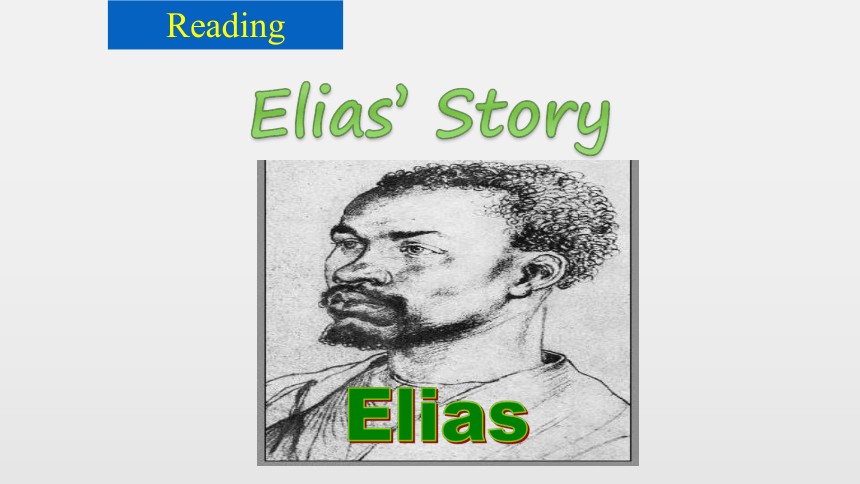
|
|
| 格式 | zip | ||
| 文件大小 | 307.2KB | ||
| 资源类型 | 教案 | ||
| 版本资源 | 人教版(新课程标准) | ||
| 科目 | 英语 | ||
| 更新时间 | 2018-11-04 00:00:00 | ||
图片预览

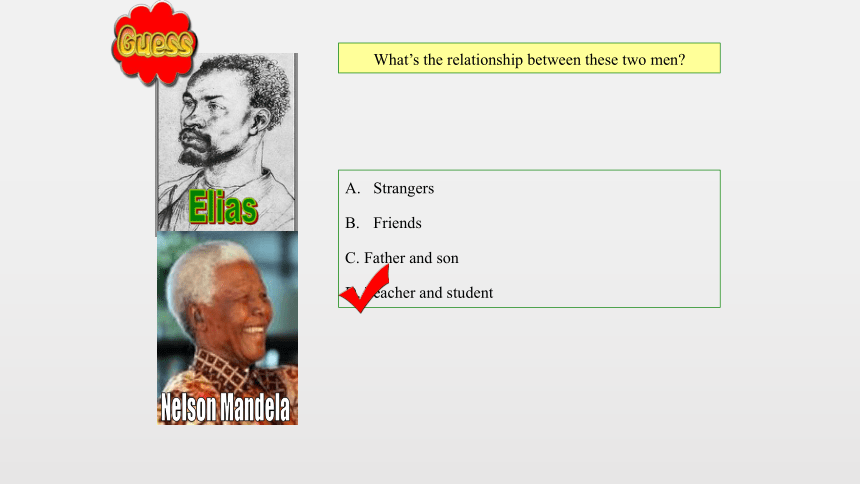
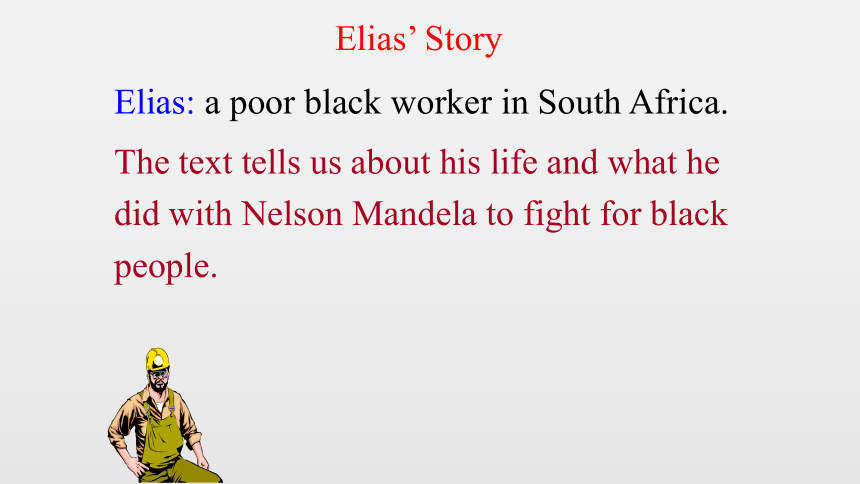
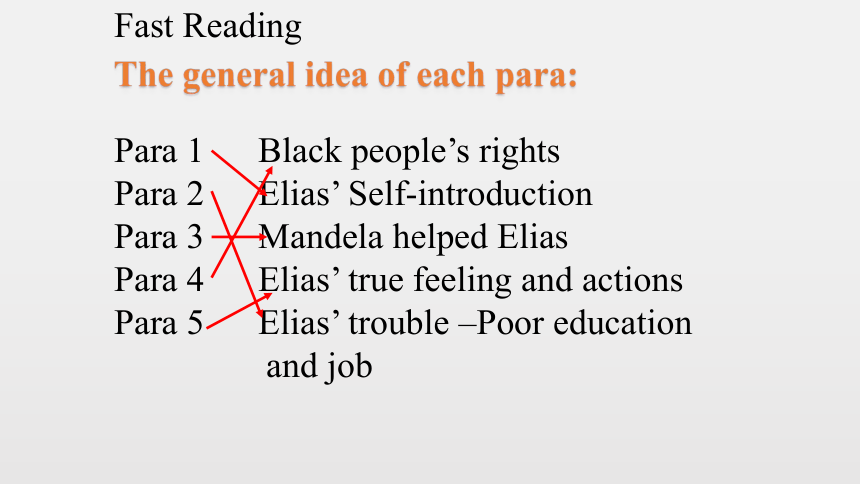
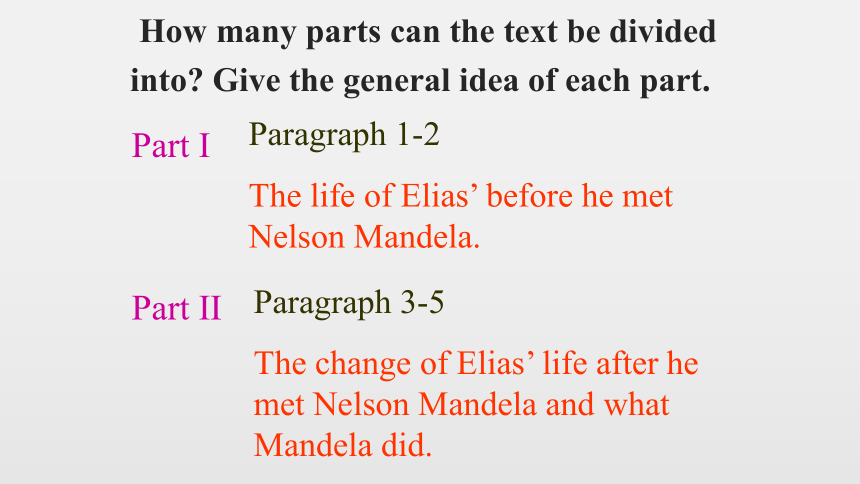
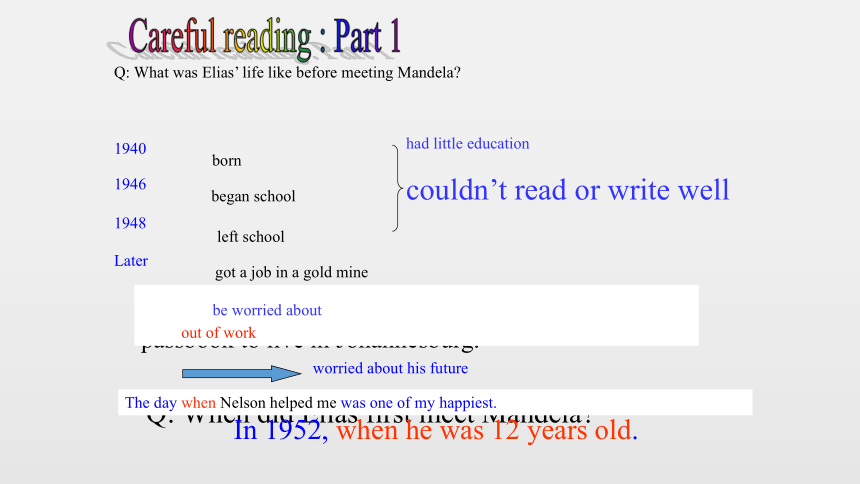
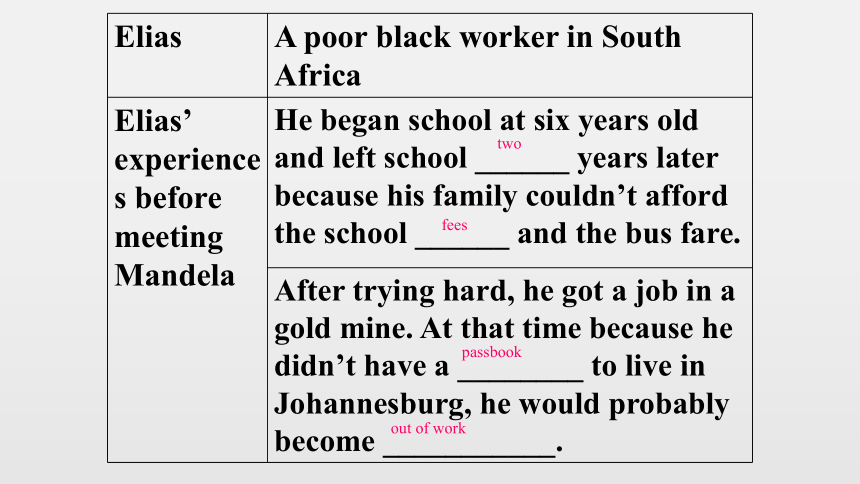
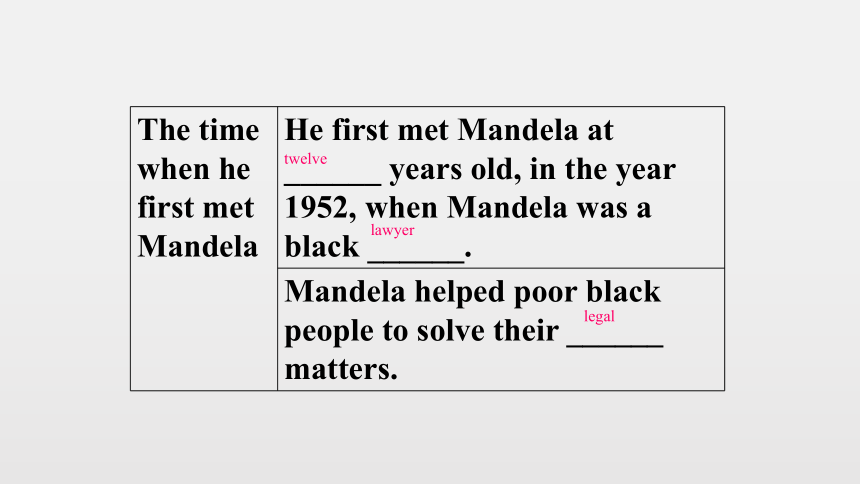
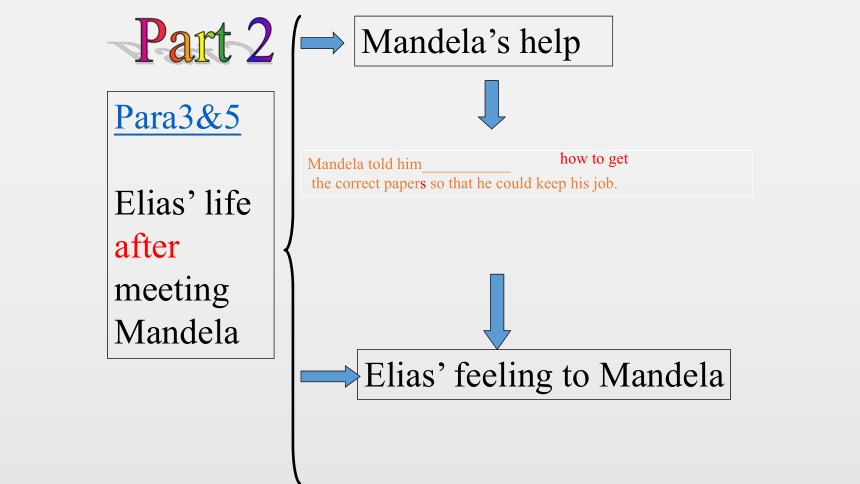
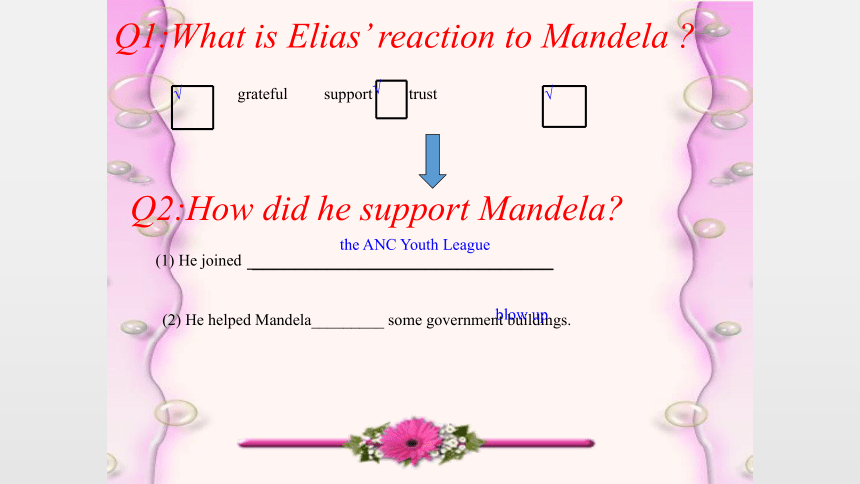
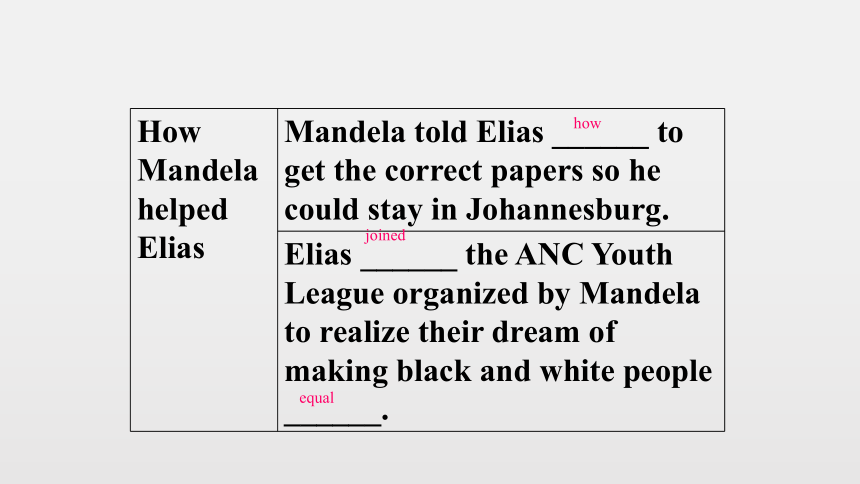
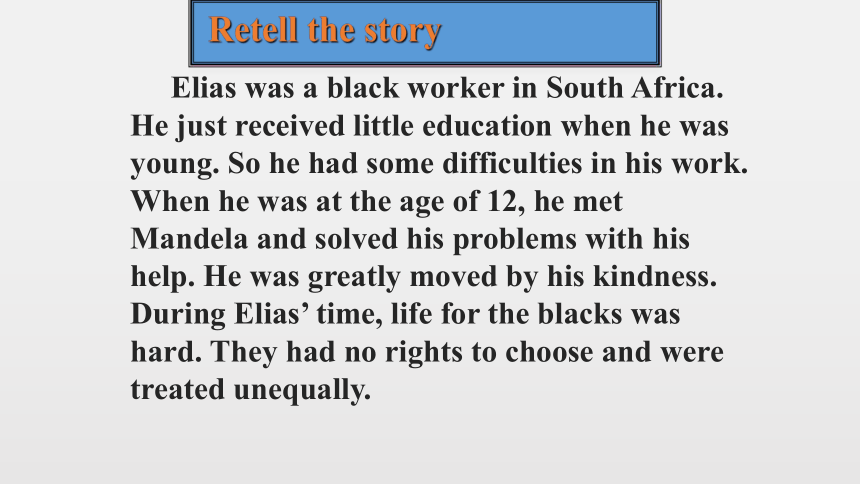
文档简介
课件58张PPT。Elias’ StoryElias ReadingElias’ StoryElias: a poor black worker in South Africa.
The text tells us about his life and what he did with Nelson Mandela to fight for black people. Fast ReadingPara 1 Black people’s rights
Para 2 Elias’ Self-introduction
Para 3 Mandela helped Elias
Para 4 Elias’ true feeling and actions
Para 5 Elias’ trouble –Poor education
and job
The general idea of each para: How many parts can the text be divided into? Give the general idea of each part. Part IParagraph 1-2
The life of Elias’ before he met Nelson Mandela.Paragraph 3-5
The change of Elias’ life after he met Nelson Mandela and what Mandela did.Part IIQ: What was Elias’ life like before meeting Mandela?1946 began school1948 left schoolLater got a job in a gold mineHowever, this is a time when one had got to have a passbook to live in Johannesburg.1940 bornCareful reading : Part 1had little education
couldn’t read or write wellQ: When did Elias first meet Mandela?In 1952, when he was 12 years old. be worried about
out of workworried about his futureThe day when Nelson helped me was one of my happiest.twofeespassbookout of worktwelvelawyerlegalPara3&5
Elias’ life after meeting MandelaMandela’s helpElias’ feeling to MandelaMandela told him___________
the correct papers so that he could keep his job.how to get Part 2Q1:What is Elias’ reaction to Mandela ?grateful support trustQ2:How did he support Mandela?√√√ (1) He joined ____________________________(2) He helped Mandela_________ some government buildings.the ANC Youth Leagueblow uphowjoinedequal Elias was a black worker in South Africa. He just received little education when he was young. So he had some difficulties in his work. When he was at the age of 12, he met Mandela and solved his problems with his help. He was greatly moved by his kindness. During Elias’ time, life for the blacks was hard. They had no rights to choose and were treated unequally.
Retell the story So when Mandela organized the ANC Youth League to fight for the equal rights of the blacks, Elias joined it as soon as he could. At first they tried some peaceful way to break the law but it was not allowed. As a result, they had to answer violence with violence to realize their dream of making black and white people equal.
伊莱亚斯的故事
我的名字叫伊莱亚斯。我是南非的一个穷苦的黑人工人。第一次见到纳尔逊.曼德拉的时候,是我的一生中非常艰难的时期。(当时)我才12岁,那是在1952年,曼德拉是我寻求帮助的一位黑人律师。他为那些穷苦黑人提供法律指导。他十分慷慨地给予我时间,我为此非常感激。
由于我所受的教育很少,所以我需要他的帮助。我六岁开始上学,我仅仅在那里读了两年的学校有三公里远。我不得不辍学,因为我的家庭无法继续支付学费和交通费。我既不太会读,也不怎么会写。几经周折,我才在一家金矿找到一份工作。然而在那个时候,你要想住在约翰内斯堡就非得要有身份证不可。糟糕的是我没有这个证件,因为我不是在那里出生的,我很担心我是不是会失业。 约尔逊.曼德拉给予我帮助的那一天是我一生中最高兴的日子。他告诉我要想在约翰内斯堡立住脚,应当如何获取所需证件。我对自己的未来又充满了希望。我永远也忘不了他对我的恩情,当他组织了非国大青年联盟时,我马上就参加了这个组织。他说:
“过去30年来所出现的大量法律剥夺我们的权利,阻挡我们的进步,一直到今天,我们还处在几乎什么权利都没有的阶段。” 他说的是真话。当时黑人没有选举权,他们无权选择他们的领导人。他们不能做自己想要做的工作。他们所住的城区都是由白人决定的。他们被打发去住的城外地区是南非最贫穷的地区。在那儿,没有人能够种庄稼。事实上,就像纳尔逊.曼德拉所说的:
“……我们被置于这样一个境地:要么我们被迫接受低人一等的现实,要么跟政府作斗争。我们选择向法律进攻。首先我们用和平的方式来破坏法律,而当这种方式也得不到允许时,……只有到那个时候,我们才决定用暴力反抗暴力。” 事实上,我并不喜欢暴力,……但是在1963年的时候,我帮助他炸毁了一些政府大楼。那是很危险的事情,因为如果我被抓住了,可能就会被关进监狱。但是,我乐于帮忙,因为我知道,这是为了实现我们的黑人和白人平等的梦想。1. Elias went to see Nelson Mandela when he was in trouble.
2. Elias left school because the school was too far from his home.
3. Nelson Mandela helped him keep his job.1 Read the text carefully and tell the statement True or False.TFTComprehending4. Elias trusted Nelson Mandela and he joined the ANC Youth League.
5. Elias was willing to blow up government buildings.
6. Nelson Mandela thought violence was a good way to help black people.FFT1. Why did Elias visit Nelson Mandela?Because he needed legal help. He was
not allowed to work without a passbook.2. What did Mandela do to help black
people?Mandela helped black people by offering guidance to them on legal problem and
organized the ANC Youth League to help the black. 2 Answer these questions in pairs.3. What was Elias's attitude towards the unfair situation black people faced? How do you know?Elias felt angry about the unfair situation black people faced. He tells us in the story that black people could not choose where to live, his job or his homeland outside the city.Nelson Mandela turned to violence
because he felt there was no other
way to change this unfair situation.4. Why did Nelson Mandela turn to
violence to make black and white
people equal?1940—
1942—
1944—
1946—A timeline of Elias’s life.Elias was born.
Elias was two years old.
Elias was four years old.
Elias began school.3 Now make a timeline of Elia’s life. Scan the reading passage to help you.1948—
1950—
1952—
1954—Elias left school.
Nelson Mandela opened his law firm.
Elias was 12 and met Nelson Mandela.
Elias was 14 and encouraged by Mandela. 4 Discuss in pairs and explain the quotes in your own words.
1. “ The last thirty years have seen the greatest number of laws…we have no rights at all.”For the last thirty years many laws have been passed. These laws have taken away our rights. They have stopped us from developing a better life. Now we have very few of these rights left.2. How do you comprehend Mandela’s saying “we were put into a position … we decided to answer violence with violence.2. We were pushed into a very difficult situation. I had only two choices: to give up our rights and accept all the unfair laws, or to fight against the government for our rights. We decided to fight against the laws. First we fought the law in a peaceful way. When this was not allowed…we had no choice but to use violence because the government were violent to us.1. It was in 1952 and Mandela was the
black lawyer to whom I went for advice.
advice [U] advise v.
a piece of advice 一条建议
give sb. advice on…关于…给某人建议
Language Points2) advise sb. to do sth. 建议某人干……
Our teacher advises us to practice
more spoken English.
3) advise that +sb. (should) do
I advise that you (should) not make noise in class.2. …and I worried about whether I
would become out of work.
worry v. 担心, 忧虑
worry about=be worried about
She worries about her health.
= She is worried about her health.
be out of work失业= lose one’s job
= be unemployedYou'll?be?out?of?work?if?you?keep?coming?late. out of breath
out of petrol out of use
out of order
out of control out of danger
out of sight
上气不接下气
汽油用完了
没用了
出故障了
失控了
脱离危险了
看不见了 out of fashion out of date
不时兴
过时
3. hopeful adj 怀有希望的
be/feel/hopeful about/of ---
对---抱有希望
Are you hopeful about your future?
We should feel hopeful of our success.
We are hopeful that our dream will come true.4. The last thirty years have seen the
greatest number of laws stopping our
rights and progress, until today we have
reached a stage where we have almost
no rights at all.
过去三十年里出现了大量的法律来剥夺
我们的权利, 阻挡我们的进步, 直到今天
我们还处在几乎什么权利都没有的阶段。 see 在此句意为“见证, 目睹”; (在某段时期)发生(某情况), 经历, 经受。
The last few months has seen more and more traffic accidents.
The city has seen many changes.
You?are?at?a?wonderful?stage?of?life.
你在一个美妙的人生舞台上。
5. vote on 投票表决
vote for/against 投票支持/反对
Let’s vote on it.
It’s certain that I will vote for it.
He has right to vote against it.
We’ll vote to decide whether to carry out the plan.
vote to do sth 投票决定做某事6. attack n./v.
He made an attack on the government’s
actions.攻击 /袭击/ 抨击
The government’s actions were under attack.
遭到袭击 / 抨击
The death of the actor is due to a heart attack.
心脏病突发
The enemy attacked us at night.7. …only then did we decide to answer
violence with violence.
只是在那时我们才决定以暴力对暴力。
only修饰状语放句首时, 句子要部分倒装
Only by practicing a few hours every day
will you be able to master English.
You can leave only when he comes.
= ______ ______ he comes _____ you leave. Only when can8. As a matter of fact, I do not like
violence…but in 1963 I helped him
blow up some government buildings.
事实上我不喜欢暴力……但在1963年
我帮他炸了一些政府大楼.
as a matter of fact = in fact=actually
As a matter of fact, I don’t know the truth.blow up
A balloon expands when it is blown up.
The government buildings were blown up.使充气,爆炸,炸毁9. But I was happy to help because I knew
it would help us achieve our dream of
making black and white people equal.
但是, 我乐于帮忙, 因为我知道, 这是为了
帮助实现我们的黑人和白人平等的梦想。
equal adj. 相等的; 平等的
equally adv.
法律面前人人平等.
Everyone is equal under the law.be equal to 等于, 相当于; 能胜任
一里等于半公里。
One li is equal to half a kilometer.
All men are born equal.
I’m not equal to the job.10. in trouble 有麻烦, 处于不幸中
He is willing to help me whenever
I am in trouble.
out of trouble 摆脱麻烦;脱离了困境
have trouble (in) doing sth.
have difficulty (in) doing sth
make trouble 制造麻烦
take trouble to do sth. 费心做某事11. willing adj 乐意的, 自愿的
be willing to do sth 愿意做某事
be willing that sb (should ) do sth
乐意让某人做某事
I’m very willing to vote for the plan.
He is willing that his little son should
join the army.12. turn to 求助于,致力于
You can turn to the people’s police for help, no matter what kind of trouble you are in.
I have turned to all the well-known reference books for help, but so far without success. Discovering useful words and expressions
1 Find the words that mean the same from the text. 1 _________ group of people organized for a special purpose
2 _________ help and advice given to someone
3 ____________ not have a job
4 _________ showing great love for someone or somethingleagueguidanceout of workdevotedLearning about language5 ______unkind; ungenerous
6 ______a time or state that something reaches as it grows
7 _____money paid for going to school
8 ________ basic general truth
9 ________ the human race
10 ______period of being youngstagefeeprinciplemankindyouthmeancalmcalmnessselfishnessillillnessloneliness2 Scan through the vocabulary list of this book and the words you have learned. Use the correct endings to form new words. hopefulpeacefulbeautysuccesshopefullypeacefullybeautifulbeautifullysuccessfulsuccessfully3 Complete the passage with words and the phrase from the box below. You may change the form if necessary.
equal official worry about mankind lawyer attack republic quality violence legal hopeful vote active My name is Robert Sobukwe. Like Nelson Mandela I was a ______ who believed that all ________ is created ______. I hate ______ and tried to use ____ ways so that black people could ____ for their government. As I live in South Africa, the ______ of the South African _______ did not agree with me. lawyermankindequalviolencelegalvoteofficialsRepublic They _______ me for encouraging the blacks to fight against the government and put me in prison. Nobody was allowed to talk to me for five long years and I lost the ability to talk. Before I went to prison, I had been ________ that things would change. hopefulattacked After I was released I found the _______ of life for black people had got worse. I was _____________ my future, and soon I fell ill. Although I was not as successful as Nelson Mandela, many people remember me as one of the first ______ black fighters for human rights in South Africa.qualityworried aboutactiveDiscovering useful structures1 Look at the reading passage again. Find sentences with attributive clauses which use where, when, or preposition+ which/ whom.
EXAMPLE: The time when I first met Nelson Mandela…
1( where)_______________________________
2( when )_______________________________
3( prep+which )_________________________
4( prep+whom )_________________________The school where I studied for only two years was three kilometers away.
2. …we have reached a stage where we have almost no rights at all.
3. The places outside the town where they were sent to live were the poorest part of South Africa.
4. The time when I first met Nelson Mandela was a very difficult period of my life.
5. This was a time when one had got to have a passbook to live in Johannesburg.
6. The day when Nelson Mandela helped me was one of my happiest.
7. He was generous with his time, for which I was grateful.
8. The parts of town in which they had to live were decided by white people.
9. …we were put into a position in which we had either to accept we were less important, or fight the government.
10. It was in 1952 and Mandela was the black lawyer to whom I went for advice.
小结:
1. where引导的定语从句修饰表示地点的名词,并在定语从句中作地点状语, 相当于“介词+ 关系代词(which)”。This is the house where I lived two years ago.in which(=in the house)=2. when引导的定语从句修饰表示时间的名词,并在定语从句中作时间状语,相当于“介词+关系代词(which)”。I’ll never forget the day when I joined the league.on which(=on the day)=
3. why表示原因,通常跟在reason后引导定语从句。相当于for which
I don’t know the reason why ( for which) he left here.
This is the reason why (= for which) he cried.
The text tells us about his life and what he did with Nelson Mandela to fight for black people. Fast ReadingPara 1 Black people’s rights
Para 2 Elias’ Self-introduction
Para 3 Mandela helped Elias
Para 4 Elias’ true feeling and actions
Para 5 Elias’ trouble –Poor education
and job
The general idea of each para: How many parts can the text be divided into? Give the general idea of each part. Part IParagraph 1-2
The life of Elias’ before he met Nelson Mandela.Paragraph 3-5
The change of Elias’ life after he met Nelson Mandela and what Mandela did.Part IIQ: What was Elias’ life like before meeting Mandela?1946 began school1948 left schoolLater got a job in a gold mineHowever, this is a time when one had got to have a passbook to live in Johannesburg.1940 bornCareful reading : Part 1had little education
couldn’t read or write wellQ: When did Elias first meet Mandela?In 1952, when he was 12 years old. be worried about
out of workworried about his futureThe day when Nelson helped me was one of my happiest.twofeespassbookout of worktwelvelawyerlegalPara3&5
Elias’ life after meeting MandelaMandela’s helpElias’ feeling to MandelaMandela told him___________
the correct papers so that he could keep his job.how to get Part 2Q1:What is Elias’ reaction to Mandela ?grateful support trustQ2:How did he support Mandela?√√√ (1) He joined ____________________________(2) He helped Mandela_________ some government buildings.the ANC Youth Leagueblow uphowjoinedequal Elias was a black worker in South Africa. He just received little education when he was young. So he had some difficulties in his work. When he was at the age of 12, he met Mandela and solved his problems with his help. He was greatly moved by his kindness. During Elias’ time, life for the blacks was hard. They had no rights to choose and were treated unequally.
Retell the story So when Mandela organized the ANC Youth League to fight for the equal rights of the blacks, Elias joined it as soon as he could. At first they tried some peaceful way to break the law but it was not allowed. As a result, they had to answer violence with violence to realize their dream of making black and white people equal.
伊莱亚斯的故事
我的名字叫伊莱亚斯。我是南非的一个穷苦的黑人工人。第一次见到纳尔逊.曼德拉的时候,是我的一生中非常艰难的时期。(当时)我才12岁,那是在1952年,曼德拉是我寻求帮助的一位黑人律师。他为那些穷苦黑人提供法律指导。他十分慷慨地给予我时间,我为此非常感激。
由于我所受的教育很少,所以我需要他的帮助。我六岁开始上学,我仅仅在那里读了两年的学校有三公里远。我不得不辍学,因为我的家庭无法继续支付学费和交通费。我既不太会读,也不怎么会写。几经周折,我才在一家金矿找到一份工作。然而在那个时候,你要想住在约翰内斯堡就非得要有身份证不可。糟糕的是我没有这个证件,因为我不是在那里出生的,我很担心我是不是会失业。 约尔逊.曼德拉给予我帮助的那一天是我一生中最高兴的日子。他告诉我要想在约翰内斯堡立住脚,应当如何获取所需证件。我对自己的未来又充满了希望。我永远也忘不了他对我的恩情,当他组织了非国大青年联盟时,我马上就参加了这个组织。他说:
“过去30年来所出现的大量法律剥夺我们的权利,阻挡我们的进步,一直到今天,我们还处在几乎什么权利都没有的阶段。” 他说的是真话。当时黑人没有选举权,他们无权选择他们的领导人。他们不能做自己想要做的工作。他们所住的城区都是由白人决定的。他们被打发去住的城外地区是南非最贫穷的地区。在那儿,没有人能够种庄稼。事实上,就像纳尔逊.曼德拉所说的:
“……我们被置于这样一个境地:要么我们被迫接受低人一等的现实,要么跟政府作斗争。我们选择向法律进攻。首先我们用和平的方式来破坏法律,而当这种方式也得不到允许时,……只有到那个时候,我们才决定用暴力反抗暴力。” 事实上,我并不喜欢暴力,……但是在1963年的时候,我帮助他炸毁了一些政府大楼。那是很危险的事情,因为如果我被抓住了,可能就会被关进监狱。但是,我乐于帮忙,因为我知道,这是为了实现我们的黑人和白人平等的梦想。1. Elias went to see Nelson Mandela when he was in trouble.
2. Elias left school because the school was too far from his home.
3. Nelson Mandela helped him keep his job.1 Read the text carefully and tell the statement True or False.TFTComprehending4. Elias trusted Nelson Mandela and he joined the ANC Youth League.
5. Elias was willing to blow up government buildings.
6. Nelson Mandela thought violence was a good way to help black people.FFT1. Why did Elias visit Nelson Mandela?Because he needed legal help. He was
not allowed to work without a passbook.2. What did Mandela do to help black
people?Mandela helped black people by offering guidance to them on legal problem and
organized the ANC Youth League to help the black. 2 Answer these questions in pairs.3. What was Elias's attitude towards the unfair situation black people faced? How do you know?Elias felt angry about the unfair situation black people faced. He tells us in the story that black people could not choose where to live, his job or his homeland outside the city.Nelson Mandela turned to violence
because he felt there was no other
way to change this unfair situation.4. Why did Nelson Mandela turn to
violence to make black and white
people equal?1940—
1942—
1944—
1946—A timeline of Elias’s life.Elias was born.
Elias was two years old.
Elias was four years old.
Elias began school.3 Now make a timeline of Elia’s life. Scan the reading passage to help you.1948—
1950—
1952—
1954—Elias left school.
Nelson Mandela opened his law firm.
Elias was 12 and met Nelson Mandela.
Elias was 14 and encouraged by Mandela. 4 Discuss in pairs and explain the quotes in your own words.
1. “ The last thirty years have seen the greatest number of laws…we have no rights at all.”For the last thirty years many laws have been passed. These laws have taken away our rights. They have stopped us from developing a better life. Now we have very few of these rights left.2. How do you comprehend Mandela’s saying “we were put into a position … we decided to answer violence with violence.2. We were pushed into a very difficult situation. I had only two choices: to give up our rights and accept all the unfair laws, or to fight against the government for our rights. We decided to fight against the laws. First we fought the law in a peaceful way. When this was not allowed…we had no choice but to use violence because the government were violent to us.1. It was in 1952 and Mandela was the
black lawyer to whom I went for advice.
advice [U] advise v.
a piece of advice 一条建议
give sb. advice on…关于…给某人建议
Language Points2) advise sb. to do sth. 建议某人干……
Our teacher advises us to practice
more spoken English.
3) advise that +sb. (should) do
I advise that you (should) not make noise in class.2. …and I worried about whether I
would become out of work.
worry v. 担心, 忧虑
worry about=be worried about
She worries about her health.
= She is worried about her health.
be out of work失业= lose one’s job
= be unemployedYou'll?be?out?of?work?if?you?keep?coming?late. out of breath
out of petrol out of use
out of order
out of control out of danger
out of sight
上气不接下气
汽油用完了
没用了
出故障了
失控了
脱离危险了
看不见了 out of fashion out of date
不时兴
过时
3. hopeful adj 怀有希望的
be/feel/hopeful about/of ---
对---抱有希望
Are you hopeful about your future?
We should feel hopeful of our success.
We are hopeful that our dream will come true.4. The last thirty years have seen the
greatest number of laws stopping our
rights and progress, until today we have
reached a stage where we have almost
no rights at all.
过去三十年里出现了大量的法律来剥夺
我们的权利, 阻挡我们的进步, 直到今天
我们还处在几乎什么权利都没有的阶段。 see 在此句意为“见证, 目睹”; (在某段时期)发生(某情况), 经历, 经受。
The last few months has seen more and more traffic accidents.
The city has seen many changes.
You?are?at?a?wonderful?stage?of?life.
你在一个美妙的人生舞台上。
5. vote on 投票表决
vote for/against 投票支持/反对
Let’s vote on it.
It’s certain that I will vote for it.
He has right to vote against it.
We’ll vote to decide whether to carry out the plan.
vote to do sth 投票决定做某事6. attack n./v.
He made an attack on the government’s
actions.攻击 /袭击/ 抨击
The government’s actions were under attack.
遭到袭击 / 抨击
The death of the actor is due to a heart attack.
心脏病突发
The enemy attacked us at night.7. …only then did we decide to answer
violence with violence.
只是在那时我们才决定以暴力对暴力。
only修饰状语放句首时, 句子要部分倒装
Only by practicing a few hours every day
will you be able to master English.
You can leave only when he comes.
= ______ ______ he comes _____ you leave. Only when can8. As a matter of fact, I do not like
violence…but in 1963 I helped him
blow up some government buildings.
事实上我不喜欢暴力……但在1963年
我帮他炸了一些政府大楼.
as a matter of fact = in fact=actually
As a matter of fact, I don’t know the truth.blow up
A balloon expands when it is blown up.
The government buildings were blown up.使充气,爆炸,炸毁9. But I was happy to help because I knew
it would help us achieve our dream of
making black and white people equal.
但是, 我乐于帮忙, 因为我知道, 这是为了
帮助实现我们的黑人和白人平等的梦想。
equal adj. 相等的; 平等的
equally adv.
法律面前人人平等.
Everyone is equal under the law.be equal to 等于, 相当于; 能胜任
一里等于半公里。
One li is equal to half a kilometer.
All men are born equal.
I’m not equal to the job.10. in trouble 有麻烦, 处于不幸中
He is willing to help me whenever
I am in trouble.
out of trouble 摆脱麻烦;脱离了困境
have trouble (in) doing sth.
have difficulty (in) doing sth
make trouble 制造麻烦
take trouble to do sth. 费心做某事11. willing adj 乐意的, 自愿的
be willing to do sth 愿意做某事
be willing that sb (should ) do sth
乐意让某人做某事
I’m very willing to vote for the plan.
He is willing that his little son should
join the army.12. turn to 求助于,致力于
You can turn to the people’s police for help, no matter what kind of trouble you are in.
I have turned to all the well-known reference books for help, but so far without success. Discovering useful words and expressions
1 Find the words that mean the same from the text. 1 _________ group of people organized for a special purpose
2 _________ help and advice given to someone
3 ____________ not have a job
4 _________ showing great love for someone or somethingleagueguidanceout of workdevotedLearning about language5 ______unkind; ungenerous
6 ______a time or state that something reaches as it grows
7 _____money paid for going to school
8 ________ basic general truth
9 ________ the human race
10 ______period of being youngstagefeeprinciplemankindyouthmeancalmcalmnessselfishnessillillnessloneliness2 Scan through the vocabulary list of this book and the words you have learned. Use the correct endings to form new words. hopefulpeacefulbeautysuccesshopefullypeacefullybeautifulbeautifullysuccessfulsuccessfully3 Complete the passage with words and the phrase from the box below. You may change the form if necessary.
equal official worry about mankind lawyer attack republic quality violence legal hopeful vote active My name is Robert Sobukwe. Like Nelson Mandela I was a ______ who believed that all ________ is created ______. I hate ______ and tried to use ____ ways so that black people could ____ for their government. As I live in South Africa, the ______ of the South African _______ did not agree with me. lawyermankindequalviolencelegalvoteofficialsRepublic They _______ me for encouraging the blacks to fight against the government and put me in prison. Nobody was allowed to talk to me for five long years and I lost the ability to talk. Before I went to prison, I had been ________ that things would change. hopefulattacked After I was released I found the _______ of life for black people had got worse. I was _____________ my future, and soon I fell ill. Although I was not as successful as Nelson Mandela, many people remember me as one of the first ______ black fighters for human rights in South Africa.qualityworried aboutactiveDiscovering useful structures1 Look at the reading passage again. Find sentences with attributive clauses which use where, when, or preposition+ which/ whom.
EXAMPLE: The time when I first met Nelson Mandela…
1( where)_______________________________
2( when )_______________________________
3( prep+which )_________________________
4( prep+whom )_________________________The school where I studied for only two years was three kilometers away.
2. …we have reached a stage where we have almost no rights at all.
3. The places outside the town where they were sent to live were the poorest part of South Africa.
4. The time when I first met Nelson Mandela was a very difficult period of my life.
5. This was a time when one had got to have a passbook to live in Johannesburg.
6. The day when Nelson Mandela helped me was one of my happiest.
7. He was generous with his time, for which I was grateful.
8. The parts of town in which they had to live were decided by white people.
9. …we were put into a position in which we had either to accept we were less important, or fight the government.
10. It was in 1952 and Mandela was the black lawyer to whom I went for advice.
小结:
1. where引导的定语从句修饰表示地点的名词,并在定语从句中作地点状语, 相当于“介词+ 关系代词(which)”。This is the house where I lived two years ago.in which(=in the house)=2. when引导的定语从句修饰表示时间的名词,并在定语从句中作时间状语,相当于“介词+关系代词(which)”。I’ll never forget the day when I joined the league.on which(=on the day)=
3. why表示原因,通常跟在reason后引导定语从句。相当于for which
I don’t know the reason why ( for which) he left here.
This is the reason why (= for which) he cried.
